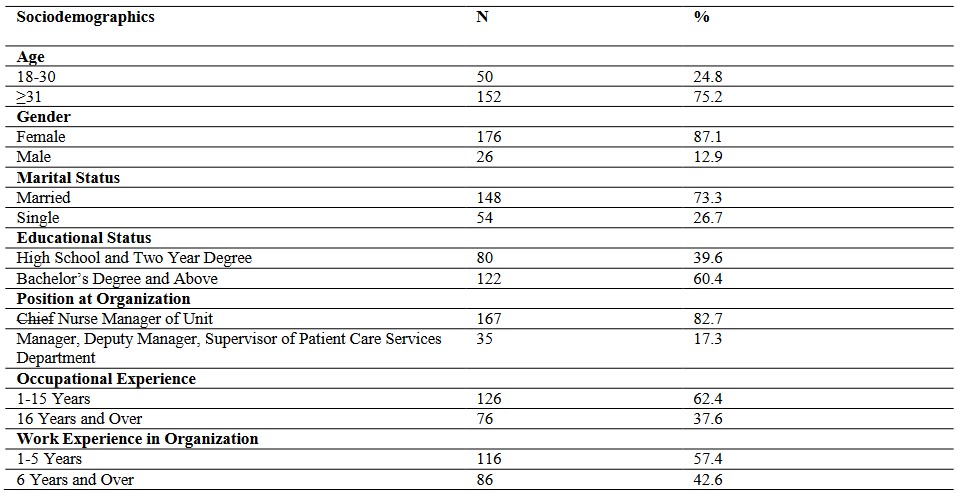
ABSTRACT
This is a descriptive study that is conducted to determine professional attitudes of nurse managers. The study population was formed by all nurses at a managerial position in a group of hospitals in Turkey from May 2018 to July 2018. The study sample included 202 nurses, who agreed to be enrolled and were not on sick leave or administrative leave in the study period. Data is collected using personal characteristics form and Inventory of Professional Attitude at Occupation. Data is electronically analyzed with percentile, mean, T test and Mann-Whitney U test. It is revealed out that 75.2% of nurses aged 31 or above, 87.1% were female, 62.4% had professional experience of 1 to 15 years and 57.4% had been working for 1 to 5 years in the organization. Total score of Inventory of Professional Attitude at Occupation was 142.49±23.6. It is determined that age, gender, marital status, professional experience, corporate experience and professional position do not influence the professional attitude at occupation (p>0.05), while the educational status affected the professional attitude at occupation (p<0.05). Cronbach Alpha value of Inventory of Professional Attitude at Occupation was 0.97. According to data of the study, it is determined that professional attitude of nurses is at good level. It is recommended to promote continuous education to evaluate improvement in professional attitude aspects of nurses and for professionalism.
KEY WORDS: Nursing Care, Professionalism, Professional Attitude
1. INTRODUCTION
Nursing is a professional health discipline that deals with health of population and each individual and prioritizes self-development (Karadaglı, 2016). Professionalism can be defined as use of knowledge, skills and attitudes, which all members of an occupation should have, while playing the professional roles and fulfilling the responsibilities (Erbil and Bakır, 2009; Tarhan et al., 2016), while a professional person implies an individual who decides professional and ethical values in line with the rules of the occupation, is open for continuous learning, changes and novelties, uses technical and scientific aspects of the occupation well, is creative and has unique skills, may act autonomously and has strong knowledge about the
occupation (Zakari et al., 2010; Adıguzel et al., 2011; Tarhan et al., 2016; Ertekin Pınar et al., 2013).
Recently, health sector experience continuous and quick changes. Nurses face more ethical and moral problems in patient care procedures in line with the quick changes in social value system and they are ever increasingly requested safe, qualified and quality healthcare services. Fulfillment of these requests requires services by not only experienced nurses, but also professional nurses. Therefore, nurses are extremely responsible for gaining and updating qualifications at regular intervals. Since nursing care has a strong influence on patient satisfaction and health outcomes, it is mandatory for nurses to act professionally (Braganca, 2017).
Today, the momentum gained by scientific studies has increased the number of nurses who are well research-oriented, open to novelties and self-development, are aware of their responsibilities and have strong communication skills and leadership aspects (Unsar et al., 2011). These characteristics boost the professionalism in the nurses and thus, nurses render patient care wit higher quality along with a change and improvement in their occupational perspective (Oweis, 2005).
Professionalism in nursing is effective on professional development, quality of nursing care, occupational esteem, autonomy, job satisfaction and corporate efficiency. Nurse managers are responsible for managing and executing all these processes due to their duties and authorizations. It is important to boost professional practices in order to have nurse managers supervise themselves and other nurses, whom they are responsible for. Studies are conducted to increase level of professionalism in nurses and nursing practices by evaluating the professional attitudes of nurse managers. This study is conducted to determine the professional attitudes of nurse managers at their occupation.
2. MATERIALS AND METHOD
This is a descriptive study that is conducted to determine professional attitudes of nurse managers.
The study population is formed by all nurses (N:300) with a managerial position at hospitals of a group company in Turkey. The study sample included 202 nurses, who agreed to be enrolled and were not on sick leave or administrative leave in the study period, before a study
sample was selected.
This descriptive study is conducted on May to July 2018 in order to determine the level of professional attitude in nurses with a managerial position at hospitals of a group company in Turkey.
Written and oral consent is obtained from managers of the organization, where the study is conducted. Authorization is verbally obtained from authorized persons of establishments, before the study is started. Since the participation is voluntary, the study enrolled nurses who agreed to be enrolled.
2.1. Statistical Analysis
SSPS 21 software is used for statistical analysis of the study data. Mean, percentage, standard deviation, Cronbach Alpha, T test and Mann-Whitney U test are used for the data analysis. P value <0.05 is considered significant.
2.2. Data Collection Tools and Data Collection
Data is collected using personal characteristics form, which is developed by investigators in line with the literature, and the Inventory of Professional Attitude at Occupation. Personal characteristics form covers 7 questions that aim to address definitive characteristics of nurses.
Inventory of Professional Attitude at Occupation was developed by Erbil and Bakır in 2006. For this Likert-type inventory, each statement is given a score, ranging from 5 to 1. Each statement is scored “5” for “It is absolutely true for me”, “4” for “It is somewhat true for me”, “3” for “I am uncertain”, “2” for “It is not true for me” and “1” for “It is absolutely not true for me”. For the inventory, the score range is 32 to 160 points. Total score of the inventory gives the score of professional attitude at occupation. Higher scores points to higher level of professionalism. Cronbach Alpha of the inventory is 0.89. Cronbach Alpha of our study was 0.97.
2.3. Limitations of Study
Results of the study cannot be generalized, as the study is conducted at privately owned hospitals of a group company.
RESULTS
Table 1: Distribution of Nurse Managers by Sociodemographic Characteristics (N:202)

It is revealed out that 75.2% of the participant nurse managers aged 31 or older, 87.1% were female, 73.3% were married, 60.4% had bachelor’s and master’s degrees, 82.7% were supervisor nurses, 62.4% had occupational experience of 1 to 15 years and 57.4% had been working for 1 to 5 years in the organization (Table 1).
Table 2: Cronbach Alpha Value of Inventory of Professional Attitude at Occupation and Mean Scores

Mean score of the inventory was 4.46±0.74 in the study. Cronbach Alpha reliability coefficient of the inventory was 0.97 (Table 2).
Table 3: Distribution of Professional Attitudes of Nurse Managers at Occupation by Demographics (N:202)

When variation of professional attitude of nurse managers at occupation by demographics is evaluated, it is detected that professional attitudes of nurse managers are not influenced by age, gender, marital status, professional experience and position at the organization (p>0.05), while the education status affects the professional attitude (p<0.05; Table 3).
3. DISCUSSION
Nurse managers were mostly female and married in this study that evaluated the professional attitudes of nurse managers. Nurse managers were mostly female and married also in the study conducted by Kaya and Kantek to evaluate the professional value perceptions of nurse managers and moreover, the nurses were mostly female in the study by Karadaş et al. to evaluate professional attitudes and professionalism of nurses (Kaya and Kantek, 2016; Karadas et al., 2018). According to these findings, women nurses still predominate over the profession of nursing.
The study revealed out that the age range was 31 years and above in most of the nurse managers, their professional experience was 1 to 15 years and they were working in the organization for 1 to 15 years. The study conducted by Kaya and Kantek also reported that the age range was 31 to 40 years in most of nurse managers. The professional experience of nurse managers was mostly above 11 years in the study conducted by Kaya and Kantek (Kaya and Kantek, 2016). This result points to sufficient experience of nurse managers.
The study shows that educational status of the nurse managers is bachelor’s degree and above. Kaya and Kantek also reported that most nurse managers had bachelor’s degree or any other postgraduate degree, while Tarhan et al. conducted a study to evaluate both professional attitude at occupation and level of professionalism and the authors reported that the nurses mostly had bachelor’s degree and master’s degree; a study conducted by Sabancıogulları and Dogan showed that most nurses had bachelor’s degree (Kaya and Kantek, 2016; Tarhan et al., 2016; Sabancıogulları and Dogan, 2014). When changes in professional attitudes of nurse managers at the occupation by demographics are reviewed, it is found that the education status influenced the professional attitude (p<0.05). Similarly, Kaya and Kantek reported that the education status affected the professional value perception of the nurse managers. Dikmen et al. also conducted a study to evaluate professional attitudes of nurses and the authors reported that there was no significant difference between professional attitudes of nurses in terms of educational status and that professional attitude gets stronger, as the educational level of nurses increases. Goris et al. conducted a study titled “professional values of nurses and relevant factors” and the authors concluded that highest score was gained by nurses, who were graduated from a master’s degree programme, in the professional values scale. In a study conducted to develop a behavioral inventory for professionalism in nursing, Karadağ et al. reported the highest mean score of professionalism for the nurses, who were graduated from a master’s degree or doctorate degree programme. Tarhan et al. reported that professional attitude is higher in nurses with education status of master’s degree. Fisher conducted another study on effect of education status on professional values of nurses and reported that education is an effective factor (Dikmen et al., 2014; Goris et al., 2014; Karadag et al., 2004; Tarhan et al., 2016; Fisher, 2011). Based on these results, educational status of nurses correlates positively to the professional attitudes. Educational status is an important criterion for the development of a professional identity.
When the position at the organization is addressed in the study conducted on nurse managers, the participant nurse managers were mostly supervisor nurses. Supervisor nurse was also the most common position of the nurse managers in the study conducted by Kaya and Kantek on
nurses and the study also reported high professional attitude for nurse managers. The study conducted by Dikmen et al. reported that the nurses at position of supervisor nurse had significantly higher mean scores in the Inventory of Professional Attitude at Occupation than other nurses. Sabancıogulları and Dogan conducted a study on nurses and also reported that professional self-esteem is higher in supervisor nurses than other nurses. Karamanoglu et al. evaluated professionalism in nurses of surgery clinics and reported that occupational professionalism is higher in nurse managers than other employees (Kaya and Kantek, 2016; Dikmen et al., 2016; Sabancıogulları and Dogan, 2014; Karamanoglu et al., 2009). As is the case with our study, these facts can suggest that certain factors, such as educational status, professional experience and undertaking managerial responsible, are found in manager/supervisor nurses and these factors affect their professional attitudes positively. Our study reported that educational status influences the professional attitude of nurse managers and this finding can suggest that the higher educational status, the higher level of professional attitude.
Total score of Inventory of Professional Attitude at Occupation was 142.49±23.6 in the study. Accordingly, it is possible to speculate that professional attitudes of nurse managers are high. Occupational professional attitude of nurses was 137.39±16.29, 140.28±11.99 and 137.69.01±12.9 in studies conducted by Erol, Dikmen et al. and Karadas et al., respectively (Erol, 2016; Dikmen et al., 2014; Karadas et al., 2018). These results are in line with results of our study.
On the contrary to our study, Yılmaz and Vermisli conducted a study on nurses of intensive care unit and the reported professional attitude score was 120.28.±19.35; authors stated that professional attitude was low in nurses of the intensive care unit (Yılmaz and Vermisli, 2016).
4. CONCLUSION
Based on results of the study, it is found that professional attitude of nurse managers was at good level. It is revealed out that professional attitude of nurse managers is influenced by educational status, but not by age, gender, marital status, professional experience and their existing position. It is found that the higher education level, the higher level of professional attitude.
In the light of these results, promoting the educational status of nurse managers may contribute to higher professional attitude. Future studies may evaluate the factors that influence professional attitudes of nurse managers in a larger sample in order to make contributions to development of strategies for reinforcing the professional attitudes of nurse
managers.
DETERMINING-PROFESSIONAL-ATTITUDES-OF-NURSE-MANAGERS673150-926511
Son Gönderiler


HEMŞİRELER İÇİN KANITA DAYALI ...
12/12/2022
Adab-ı Muaşeret
14/05/2024
Under the Same Rainbow: A study on ...
17/05/2024